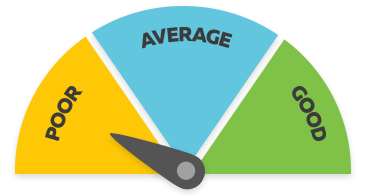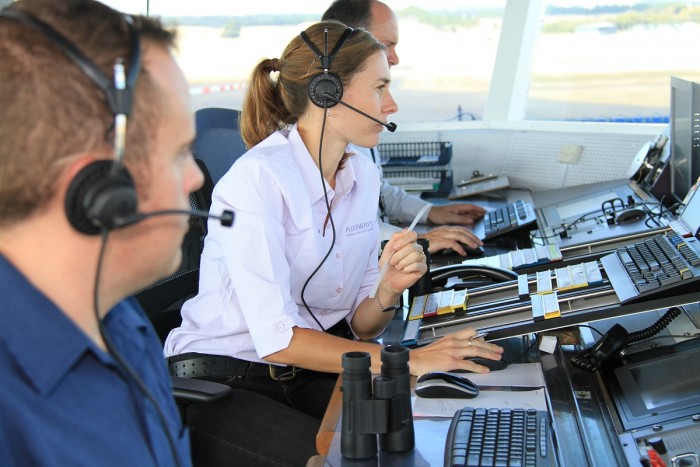Air Traffic Controller
Kaiwhakahaere Huarahi Rererangi
Alternative titles for this job
Air traffic controllers direct the safe and orderly movement of aircraft while they are flying, landing, taking off and taxiing.
Pay
Air traffic controllers usually earn
$140K-$228K per year
Air traffic controllers can earn
$92K-$247K per year
Source: TEC research
Job opportunities
Pay
Pay for air traffic controllers varies depending on where they work, their experience and their duties. Pay includes a base salary plus superannuation, shift work allowances and other benefits.
- Air traffic controllers usually earn $140,000 to $228,000.
- Air traffic controllers can earn $92,000 to $247,000.
Source: TEC research.
(This information is a guide only. Find out more about the sources of our pay information)
What you will do
Air traffic controllers may do some or all of the following:
- receive information about flights from flight plans, pilot reports, radar and observations
- direct aircraft and manage aircraft traffic flows
- advise pilots on weather conditions, the status of facilities and airports
- give pilots permission to take off, land and change altitude and direction
- give airport workers permission to move around the tarmac and runway
- monitor aircraft on a radar and resolve possible conflicts
- alert airport fire crew and rescue services in emergencies
- write reports on incidents.
Skills and knowledge
Air traffic controllers need to have knowledge of:
- meteorology
- technical flying terms
- civil aviation laws
- safety rules and emergency procedures.
Working conditions
Air traffic controllers:
- usually work seven-and-a-half hour shifts, which includes evening, night and weekend work
- usually work in control towers at airports or at surveillance (radar) centres in Auckland and Christchurch
- may work alone at small airports.
What's the job really like?

George Perigo
Air Traffic Controller
George Perigo always had a passion for aviation, so when he read about being an air traffic controller he knew it was the career for him. Since then, George has successfully completed his training and now keeps air traffic moving as a fully-qualified air traffic controller.
An important job
“A typical day essentially involves preventing collisions between aircraft, whether they are on the ground or in the air.
“Every day brings something different and I love the challenge of quickly coming up with a solution to a complex traffic situation and then moving on to the next – it’s like solving a three-dimensional puzzle.”
Fantastic work-life balance
“Air traffic controllers have strict duty times to reduce tiredness. We generally work four days on, two days off, with maximum seven-and-a-half hour shifts.
“You never take work home with you, as soon as you walk out the door, that’s it.”
You’ve got to stay calm and make good decisions
“Air traffic controllers need to have a good amount of common sense, be able to stay calm under pressure, and be good at making decisions. If you have a passion for aviation and are motivated, then this could easily be the career for you.”
Entry requirements
You need to train on the job and get qualifications to become an air traffic controller.
You need:
- to complete a training course
- a New Zealand Air Traffic Controller licence
- to be over 20 years old
- to be a New Zealand or Australian citizen or permanent resident
- to pass a police check and provide your Waka Kotahi driver history report
- to pass ability and personality tests
- to pass a drug test and a Class 3 medical assessment
- to pass an English language test.
You may need:
- a New Zealand Certificate in Air Traffic Services (Level 5)
- a New Zealand Diploma in Air Traffic Services (Level 6)
- a Bachelor of Aviation Management.
Secondary education
You usually need NCEA Level 2 to do the study or training for this job. Useful subjects include English and maths.
Personal requirements
Air traffic controllers need to be:
- very organised, with the ability to prioritise, plan and make decisions
- able to remain calm under pressure and adapt quickly to changing situations
- able to learn theory and apply it in practical situations
- excellent at spatial awareness
- mature, responsible and conscientious
- skilled in making calculations
- clear communicators and able to work well with others.
Air traffic controllers need to have a good amount of common sense, be able to stay calm under pressure, and be good at making decisions.

George Perigo
Air Traffic Controller
Useful experience
Useful experience for air traffic controllers includes:
- work as an aeroplane or helicopter pilot
- other aviation and navigation experience
- any work dealing with people
- work in industries with a strong health and safety focus, for example, emergency services.
Physical requirements
Air traffic controllers need to have:
- good hearing and eyesight (with or without corrective lenses)
- normal colour vision
- good spatial awareness.
They also need to be reasonably healthy, as they have to pass a medical examination every one to four years.
Find out more about training
- Airways International Ltd
- trainingadmin@airways.co.nz - www.airwaysinternational.com
What are the chances of getting a job?
High competition for air traffic controller roles
Vacancies for air traffic controllers are limited due to the small number of people in the role. Most air traffic controllers stay in the role for a long time so there is low staff turnover. Therefore there is high competition for any vacancies.
Limited entry to training
Airways International, the commercial arm of Airways New Zealand, only takes 12-24 trainees into its air traffic control training programme each year. Entry is very competitive.
Trainees who successfully complete the programme and meet other requirements usually get a job.
341 air traffic controllers worked in New Zealand in 2023.
New technology will change air traffic controllers' work
New technology in air traffic management systems, set to be introduced over the next 10 years, could result in a reduction in demand for air traffic controllers in the long term.
Virtual control towers are being trialled, which could mean controllers monitor air traffic from remote locations in the future.
One employer of air traffic controllers
All air traffic controllers work for Airways New Zealand.
Sources
- Airways New Zealand website, accessed July 2023, (www.airways.co.nz).
- Airways International website, accessed July 2023, (www.airwaysinternational.com).
- de Lambert, K, head of training, Airways International, careers.govt.nz interview, July 2023.
(This information is a guide only. Find out more about the sources of our job opportunities information)
Progression and specialisations
New air traffic controllers usually work at a regional control tower, dealing mostly with domestic flights. With two to three years' experience they may progress to work in an international control tower or radar centre. They may then move into management or specialist roles such as:
- Air Traffic Control Policy and Standards Specialist
- Air traffic control policy and standards specialists co-ordinate and provide advice on procedures, licensing and standards issues.
- Air Training Centre Instructor
- Air training centre instructors train air traffic controllers.
Last updated 8 October 2024


